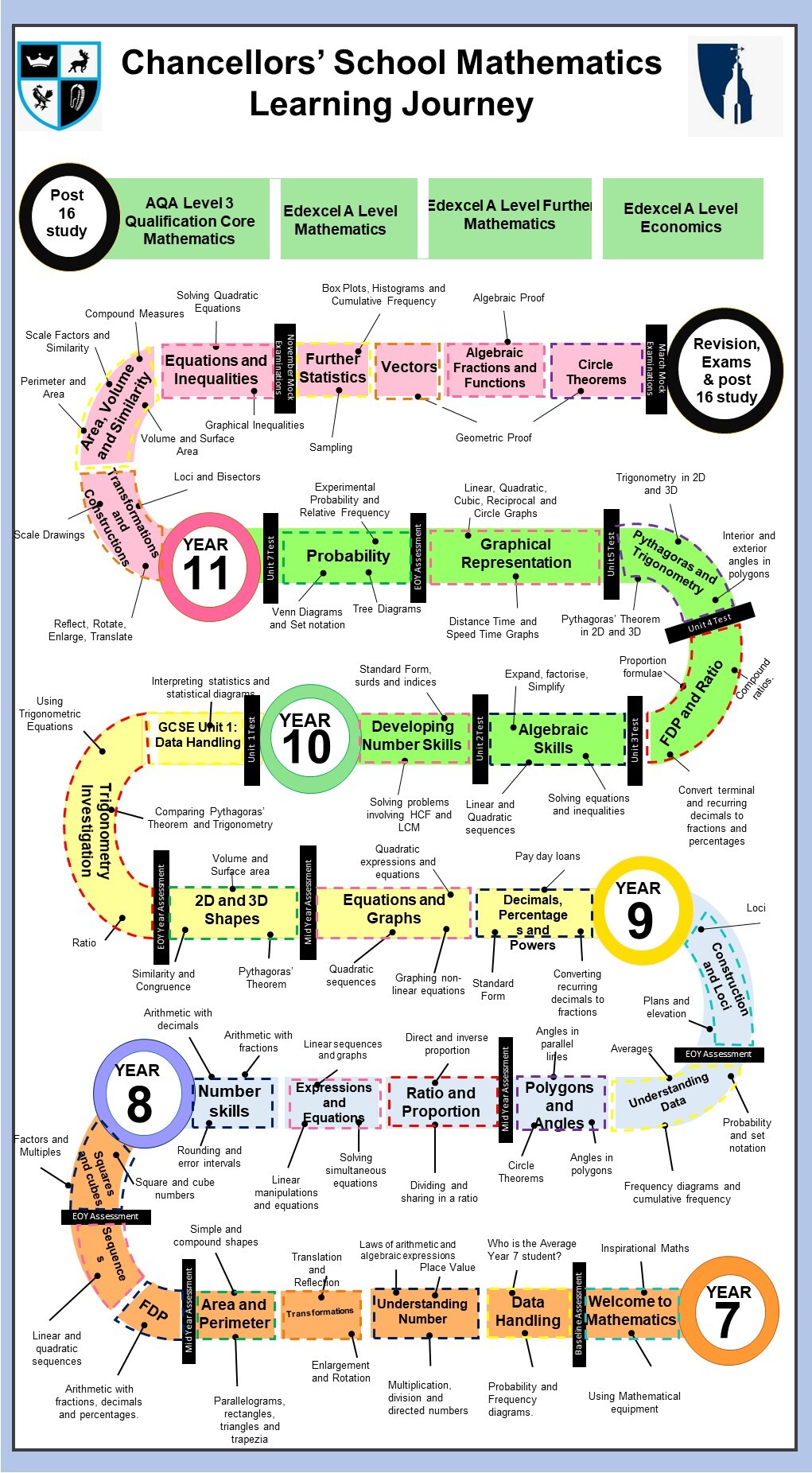Mathematics
Introduction
An understanding of mathematics is vital to provide the numeracy skills to allow us to get by in everyday life. On another level, there is an inherent beauty and wonder in mathematics which students have the opportunity to discover.
When exploring mathematics at Chancellor’s School, students will be encouraged to ask meaningful questions, develop conjectures, demonstrate resilience when challenged and solve problems by working collaboratively in groups. While we recognise, support and encourage high achievement, we value and praise the level of effort students demonstrate over their achievements.
The Mathematics Faculty at Chancellor’s School has undertaken a number of research projects to trial new methods of teaching, assessment, and supporting students’ ability to learn independently. As a result, we are confident that we provide the best learning opportunities to support students in making progress across all key stages.
Key Stage 3
In Year 7, students sit a baseline test in their first week. This provides teachers with information about strengths and areas for improvement, as well as a benchmark to measure progress throughout the year. In Year 7, students will study maths in their Form groups. Working in their Form groups provides an environment where students feel supported by their peers to take intellectual risks and work collaboratively to solve problems.
In Years 8 and Year 9, students are taught in mixed attainment classes. Students sit pre-unit and post-unit tests for every unit of work to measure progress. They will be guided by their teachers on how to improve, and are regularly encouraged to reflect on their own strengths areas for improvement. Students will also sit a mid-year and end-of-year exam.
Main areas covered:
While mathematics can be split into numeric, geometric, algebraic and statistical skills, we encourage students to make links between these ideas rather than treat them as a series of separate ideas.
Key Stage 4
In Years 10 and 11, students are taught in three streams and follow the EDEXCEL Linear specification. There are two levels of entry at GCSE, Higher and Foundation. Grades 4 to 9 can be awarded from the Higher Tier, and Grades 1 to 5 can be awarded from the Foundation Tier.
Internal assessments take place throughout the year, with Year 11 mock exams in November and March. The progress of students is closely monitored, and movement between streams takes place where appropriate.
Main topics covered:
There is a greater emphasis on problem solving in the new specification of the GCSE. In Year 10, mathematics lessons will focus on developing a deep and robust understanding of the mathematics necessary to tackle these problems. In Year 11, the focus will shift to applying their knowledge to breaking down and solving complex and unfamiliar problems.
Key Stage 5
In Years 12 and 13, students follow the EDEXCEL specification. The new linear specific means all students will sit AS and A2 modules at the end of Year 13.
Main topics covered in A level Maths:
- Year 12 – Pure Maths 1, Mechanics and Statistics.
- Year 13 – Pure Maths 2, Mechanics and Statistics.
Main Topics covered in A level Further Maths
- Year 12 – Further Pure Maths 1, with optional Statistics, Decision and Mechanics.
- Year 13 – Further Pure Maths 2, with optional Statistics, Decision and Mechanics.
Extra-Curricular
Maths Help Club – Monday to Thursday 1:15 - 1:40
UKMT (United Kingdom Mathematics Trust): Junior, Intermediate, Senior and Team. New this year: Maths Olympiad for Girls
House Competitions running every half term. Rubik’s Club every Friday. We also visit the Greenwich Maths Festival and enjoy a partnership with OPTA Data, providing sports data workshops and career insight.
How you can help at home
- Embedding a love of mathematics: It is easy to think that mathematics is a narrow subject, which focuses only on calculations. However, mathematics is more about making connections between ideas, justification, reasoning and exploring patterns. When the focus is only on memorisation and calculations many people develop a “maths phobia” which can ruin a student’s confidence in the classroom. To find further information please go to https://www.youcubed.org/resource/parent-resources/. Also, see the positive norms poster you can download at the bottom of this page.
- SPARX Maths – If your son or daughter is stuck with a particular topic, there will be a video and a self-marking quiz which will address the topic on www.sparxmaths.com. This resource will be used for homework across Years 7-10, as it is automatically inter-leaving and respond to student attainment. It is also an excellent resource for revision and we encourage students to search for topics which they need further practice on.
- Practice papers – In Key Stage 4 and 5 we will encourage students to use practice paper questions. As the specifications have recently changed, there are fewer exam papers for the students to practice on. However, www.mathsmadeeasy.co.uk has published predicted papers and specimen papers for Key Stage 4 students (Just look at the edexcel papers). Additionally, the Mathematics Faculty will produce practice paper packs which students can purchase to subsidise the cost of printing. All of these papers will be made available on show my homework, but many students prefer to work on printed copies.
Please follow the departmental Twitter Feed on: @chancmaths
Year 6 -7 - Sparx Transition Booklet


